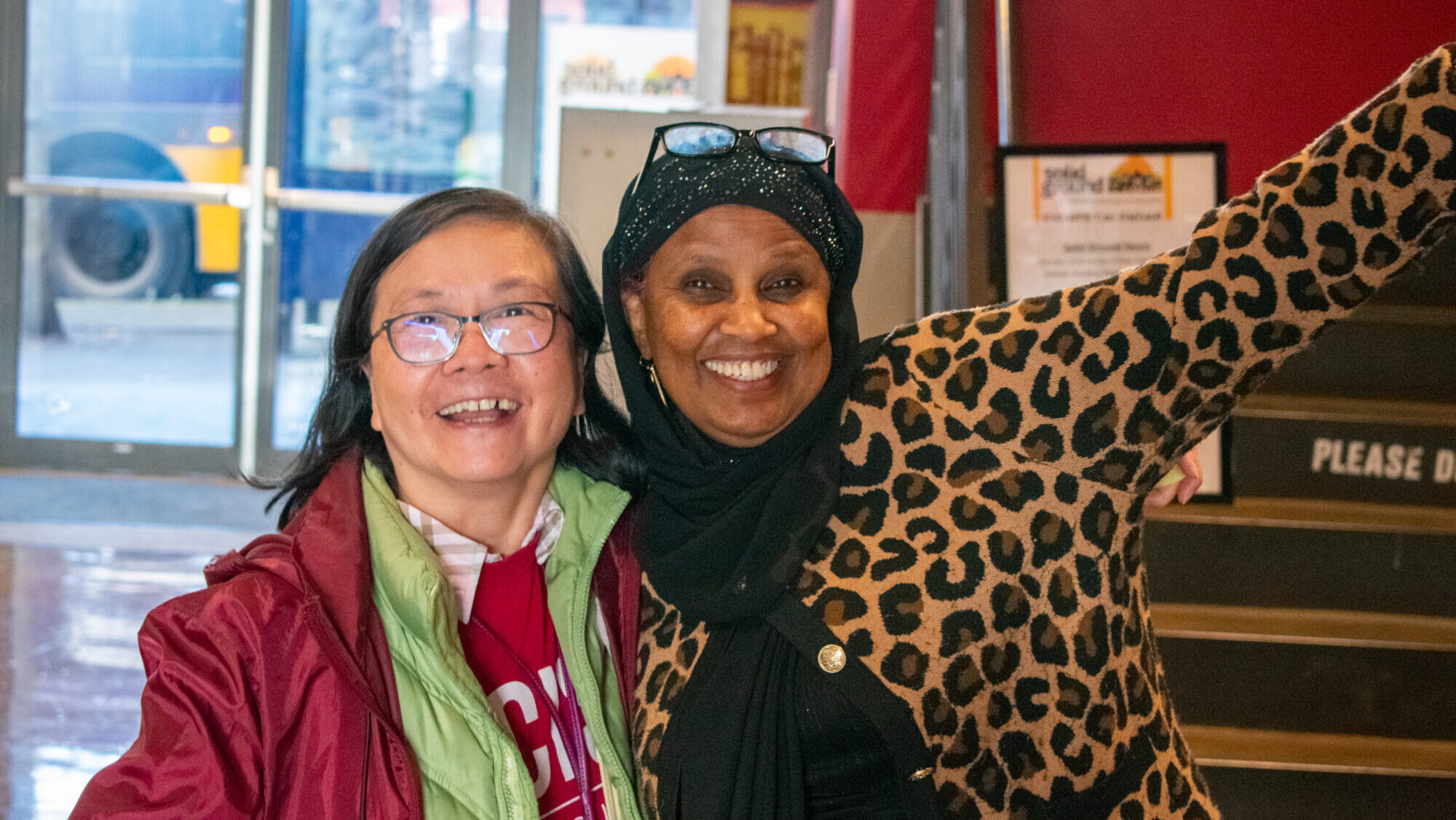In response to a growing number of Chinese elder participants visiting our Food Bank, we started a partnership with Chinese Information Services Center, or CISC, an organization that helps immigrants throughout King County achieve success in their new community by providing information, referral, advocacy, social, and support services. Since March, Andes Kong (she/her), Community Support and Outreach Coordinator for CISC’s Elder Program, has been visiting our Wallingford Food Bank each month to speak with non-English speaking Chinese participants to help us better meet their needs.
Using graphic flyers and information sheets, Andes shares information with elders who visit our Food Bank, including FAQs about what to expect during distribution and other benefits offered through our programming. Andes graciously took some time to answer our questions about her work with CISC and her experiences at our food bank, the challenges Chinese elders can face at local food banks, and why it’s important to support elders in our community.
Read our interview with Andes below!
How long have you been working at CISC and why did you decide to work there?
I have been working at CISC for 23 years and am bilingual in Chinese and English. CISC is a nonprofit, multi-service agency that helps immigrants throughout King County achieve success in their new community by providing information, referrals, advocacy, social, and support services. As a trained social worker from Hong Kong, working at CISC aligns with my career mission and passion for helping and supporting my community.
What do you enjoy most about working at CISC?
I worked with seniors at Sunshine Garden, which transitioned from the Chinese Senior Day Care Center to the Chinese Senior Community Center. I enjoyed witnessing the growth of retired seniors, whether as participants or volunteers serving our community, even though most were non-English-speaking Chinese. After 20 years, I shifted my responsibilities away from Sunshine Garden. Since 2021, I have been assigned various outreach tasks, including providing information and assistance to residents of diverse ethnic backgrounds in four contracted SHA buildings, and working on projects with an outreach focus, such as the voter education project, Democracy Voucher project, and food bank initiatives. I enjoy helping not only individuals but also groups through outreach efforts, aligning with the core goal of social work: ‘to help people help themselves.’
What is a typical day at the Wallingford Food Bank like for you?
Though my outreach work at Wallingford Food Bank is only a few hours per month, I truly value the experience. Non-English-speaking Chinese participants benefit from my assistance, not only in understanding the practical policies of the food bank but also in staying informed about various benefits. Through my active role on-site, they receive updates on food resources and other support options via graphic flyers and information sheets. I believe that my efforts help food bank participants learn about more options that fit their needs.
Why is it important to support elders in our community?
Elders devoted their energy to their families and communities when they were younger. After retirement or immigration, they deserve to enjoy well-being and a life of dignity in the U.S. It is especially important and fair to provide support to elders with little or no proficiency in English and technology. Cultural differences may also create challenges for them in integrating into the community. Non-judgmental support from volunteers or community partners of the same ethnic background can be a valuable resource, helping them connect more easily with our community.
Do Chinese elders experience challenges at local food banks like ours and have you noticed any changes since our partnership began?
Chinese elders are family-oriented. After immigrating to or retiring in the U.S., many Chinese elders with language barriers experience a shift in their roles—from being the family’s primary earners to becoming dependent on either their adult children or public benefits. Receiving food from a food bank not only helps them save money for their families but also allows them to support extended family members. They hope to regain recognition and a sense of dignity within their families. Some may mistakenly believe that food banks have unlimited funding. As a community partner with food banks, CISC can serve as a bridge to connect Chinese elders with food resources and other benefits to improve their quality of life in times of need.
Is there anything else you’d like to share with our community?
Everyone has the right to a better quality of life, regardless of age, ethnicity, or background. Food banks provide a welcoming, stigma-free environment where people feel valued when they need food. Community hubs that offer social services from various agencies at food bank sites serve as valuable resources for participants in need.

